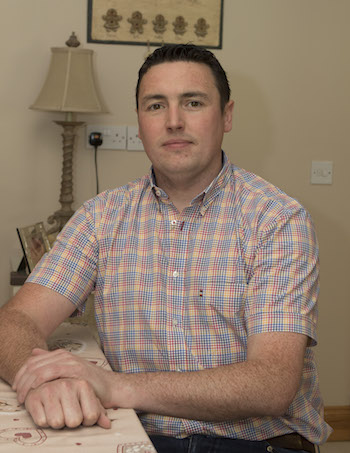A garda whistleblower on long-term stress-related absence has been instructed to return to work at a station in Donegal where he previously served, despite warnings from the Garda’s own medical officer of the associated risk to his well-being.
Garda Keith Harrison, whose claims of harassment will be considered by the upcoming Disclosures Tribunal, has been out of work on sick leave since 2014 and without pay since 2015.
He was instructed in writing on 20 January of this year by garda management to return to work at Donegal Town Garda Station, where he had served prior to going on sick leave.
He had also raised concerns about the alleged conduct by a small number of gardaí at the station.
However, according to confidential internal garda medical assessments carried out for the force, which have been seen by RTÉ’s This Week programme, the force’s own Assistant Chief
Medical Officer, Dr Richard Quigley, advised last November that there were risks associated with sending him back to a station he had worked in previously.
“Given work circumstances which are well known to management, I consider it prudent if consideration is given to Garda Harrison being assigned duties in a station other than his previous location,” the letter, dated 15 November 2016 and sent to Garda Human Resources, states.
Dr Quigley’s view was also echoed in another report, carried out for the gardaí in January of this year, by Dr Patrick Devitt, a Dublin-based consultant psychiatrist, who said that while the matter of where Garda Harrison was returned to work was “an operational one, it would certainly support his mental well being” if the location chosen was not seen by Garda Harrison as being “punitive”.
And in another confidential medical assessment, also seen by RTÉ, dated 6 October 2014, Dr Oghenovo Oghuvbu, who was then a specialist occupational physician with the Garda Occupational Health Department, wrote to the force’s Human Resources department, saying that Garda Harrison “continues to experience some impairment in his sense of well-being. This is particularly in respect of his returning to his current workplace (Donegal division) while the investigation is ongoing. This is also of concern to his treating clinical professionals”.
The decision to send Garda Harrison back to work at Donegal Town Station followed a series of meetings between Garda Harrison and senior management and HR staff from the force in December.
Garda Harrsion has been seeking a return to work since December 2015 and has been declared fit to work but on the condition it is a safe working environment, according to the various clinical assessments. He claims his career has been negatively affected after raising concerns about the conduct of a garda detective in the midlands, who he then subsequently arrested.
Responding to the instruction to deploy him to Donegal Town Station, lawyers for Garda Harrison wrote to the Garda Commissioner, as well as Justice Minister Frances Fitzgerald, expressing their concern and frustration at the decision to return Garda Harrison to work at Donegal town.
In a letter to garda management, written three days after the order to attend for duty to Donegal town, Mr Harrison’s solicitor Trevor Collins, from the Galway firm Kilfeather and Company, said it was “clear that as his employer you continue to fail in your duty owed to our client , in so far as to the detrimental effect of your actions and inaction is having on his health, you seek to cause further injury by directing that he return to duty at a place which is contrary to all the medical advice available to you”.
The solicitor described the instruction as “simply not conductive to my client’s rehabilitation and return to work”.
In one note, made by the psychiatrist Dr Devitt, as part of his January 2017 assessment, he recorded how Garda Harrison said that the loss of his garda income had left him “financially ruined”.
Dr Devitt also concluded in his report that Garda Harrison’s injury constituted an “injury on duty”, raising questions over the continued decision not to return Garda Harrison to full pay while he is absent from work.
The Garda press office declined to comment on the case, saying they could not discuss an individual’s medical records or any issues relating to them.
However, in letters between Garda Harrison’s solicitors and a senior garda manager, also seen by RTÉ’s This Week, the manager said he was hopeful some resolution could be found.
He rejected any assertion that Garda Harrison was being “financially penalised”.
Senior garda management have committed to keep the location of Garda Harrison’s deployment “under consideration” ahead of upcoming discussions.
Lawyers for Garda Harrison, and senior garda management, have agreed to engage in mediation with the former head of the Workplace Relations Commission Kieran Mulvey. It is believed that process will begin as soon as next week.
The deputy leader of the Labour Party, Alan Kelly TD, has criticised the treatment of Garda Harrison, saying it defied any explanation that Garda Harrison was instructed to return to a station for work, despite the medical advice from several physicians who pointed to the existence of clear risks to his well-being.
He said that based on the experience of other garda whistleblowers, Garda Harrison should be returned to full pay and have all his arrears taken care of.






